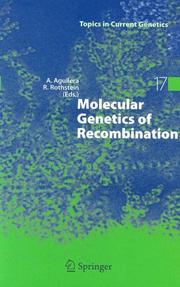| Listing 1 - 3 of 3 |
Sort by
|

ISBN: 9783540710202 3540710205 3540710213 Year: 2007 Publisher: Berlin ; New York : Springer,
Abstract | Keywords | Export | Availability | Bookmark
 Loading...
Loading...Choose an application
- Reference Manager
- EndNote
- RefWorks (Direct export to RefWorks)
Genetic recombination is an important process involved in shaping the genetic make up of progeny. Increasingly, it has become evident that recombination is a DNA repair pathway crucial during DNA replication in vegetatively growing cells. It plays a critical role in preserving the integrity of the genome by mediating the repair of DNA damage, which can occur during normal cellular metabolism as a result of oxidative stress, transcription, replication fork stalling or breakdown, or after the exposure to DNA damaging agents. Until recently, much of our knowledge on the mechanisms of genetic recombination has come from studies of prokaryotic and simple eukaryotic fungal systems. However, these studies have now been significantly extended to mammals, such that a comparative picture of the general factors and mechanisms of genetic recombination is beginning to emerge. Detailed genetic and biochemical studies have led to the isolation and characterization of many of the recombination-repair proteins in E. coli and S. cerevisiae, which in turn has led to the identification of homologues in human cells. The link between recombination defects and recombination proteins in a number of tumors as well as in human hereditary syndromes makes genetic recombination a cellular process of key importance not only in basic biology but also in biomedical studies.
Recombination, Genetic --- Cell Cycle --- DNA --- Genetic recombination. --- Molecular genetics. --- Recombinaison génétique --- Génétique moléculaire --- genetics. --- physiology. --- metabolism. --- Recombination, Genetic. --- Research. --- Genetic recombination --- Molecular genetics --- Metabolism --- Physiology --- Genetics --- Genetic Processes --- Biology --- Biological Science Disciplines --- Nucleic Acids --- Metabolic Phenomena --- Cell Physiological Processes --- Nucleic Acids, Nucleotides, and Nucleosides --- Natural Science Disciplines --- Phenomena and Processes --- Cell Physiological Phenomena --- Genetic Phenomena --- Chemicals and Drugs --- Disciplines and Occupations --- Cytology --- Health & Biological Sciences --- Life sciences. --- Biochemistry. --- Cell biology. --- Microbial genetics. --- Microbial genomics. --- Plant genetics. --- Animal genetics. --- Life Sciences. --- Cell Biology. --- Biochemistry, general. --- Microbial Genetics and Genomics. --- Plant Genetics & Genomics. --- Animal Genetics and Genomics. --- Molecular biology --- Chromosomes --- Recombinant DNA
Digital
ISBN: 9783540710219 Year: 2007 Publisher: Berlin, Heidelberg Springer-Verlag Berlin Heidelberg
Abstract | Keywords | Export | Availability | Bookmark
 Loading...
Loading...Choose an application
- Reference Manager
- EndNote
- RefWorks (Direct export to RefWorks)
Genetics --- Histology. Cytology --- General biochemistry --- Plant physiology. Plant biophysics --- Animal genetics. Animal evolution --- systematische plantkunde --- genomen (geneeskunde) --- medische genetica --- biochemie --- genetica --- cytologie --- histologie --- moleculaire biologie

ISBN: 9783540710202 9783540710219 Year: 2007 Publisher: Berlin, Heidelberg Springer-Verlag Berlin Heidelberg
Abstract | Keywords | Export | Availability | Bookmark
 Loading...
Loading...Choose an application
- Reference Manager
- EndNote
- RefWorks (Direct export to RefWorks)
Genetic recombination is an important process involved in shaping the genetic make up of progeny. Increasingly, it has become evident that recombination is a DNA repair pathway crucial during DNA replication in vegetatively growing cells. It plays a critical role in preserving the integrity of the genome by mediating the repair of DNA damage, which can occur during normal cellular metabolism as a result of oxidative stress, transcription, replication fork stalling or breakdown, or after the exposure to DNA damaging agents. Until recently, much of our knowledge on the mechanisms of genetic recombination has come from studies of prokaryotic and simple eukaryotic fungal systems. However, these studies have now been significantly extended to mammals, such that a comparative picture of the general factors and mechanisms of genetic recombination is beginning to emerge. Detailed genetic and biochemical studies have led to the isolation and characterization of many of the recombination-repair proteins in E. coli and S. cerevisiae, which in turn has led to the identification of homologues in human cells. The link between recombination defects and recombination proteins in a number of tumors as well as in human hereditary syndromes makes genetic recombination a cellular process of key importance not only in basic biology but also in biomedical studies.
| Listing 1 - 3 of 3 |
Sort by
|

 Search
Search Feedback
Feedback About UniCat
About UniCat  Help
Help News
News